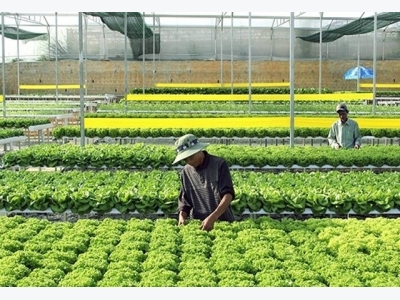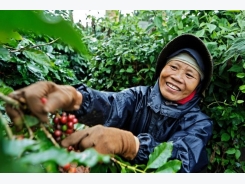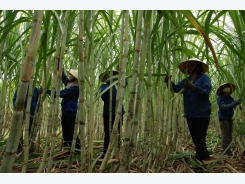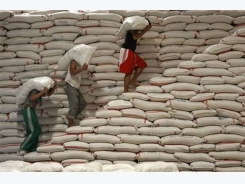ADB urges Vietnam to reform agriculture to bolster growth

A high-tech farm in the Central Highlands city of Da Lat
Agricultural reform is vital for Vietnam to boost growth and become an upper-middle-income country, says the Asian Development Bank (ABD) in a report released on April 10.
According to ADB Country Director for Vietnam, Eric Sidgwick, the sector has been a significant driver of growth and poverty reduction since the late 1980s, when the country began economic reforms known as Doi Moi.
But, he noted that agricultural growth has slowed down to an average of just 2% a year since 2011 in the face of growing international competition and low domestic labour productivity.
According to the Asian Development Outlook 2017 report, Vietnam has one of the lowest levels of agriculture labour productivity in the region, about one third of Indonesia and less than half of Thailand and the Philippines.
The ADB chief in Vietnam stated that deeper reforms and higher investment in agriculture would be critical to boost agricultural productivity and long-term growth that is inclusive and environmentally sustainable.
The report also emphasises that four main policy challenges need to be addressed to make agriculture more efficient and sustainable, which is vital to escalate growth and enable Vietnam to graduate to the upper-middle-income status.
The ADB suggests that Vietnam introduce greater competition in input supply, post-harvest processing and the marketing of agricultural produce, expanding rural infrastructure development and managing natural resources more sustainably.
The fourth suggestion is to better integrate climate change considerations into policy-making processes as Vietnam is among the countries that are highly vulnerable to climate change.
Last year, Vietnam suffered from one of the most severe droughts in a century, causing agriculture to slow down to 1.4% from 2.4% in 2015. Its effect continued in early 2017 with the sector growing by only 2.03% in the first three months of the year.
The report forecasts that Vietnam’s economy is likely to grow by 6.5% in 2017 and 6.7% in 2018, as a result of strong growth in manufacturing, buoyed by continued high levels of foreign direct investment.
Agriculture is expected to pick up modestly in 2017, given the outlook for higher global food prices and a return to normal weather, but the sector will continue to underperform, relative to the rest of the economy, dragging down overall growth.
Related news
Tools

Phối trộn thức ăn chăn nuôi

Pha dung dịch thủy canh

Định mức cho tôm ăn

Phối trộn phân bón NPK

Xác định tỷ lệ tôm sống

Chuyển đổi đơn vị phân bón

Xác định công suất sục khí

Chuyển đổi đơn vị tôm

Tính diện tích nhà kính

Tính thể tích ao



 Your next Kobe beef may come from Vietnam
Your next Kobe beef may come from Vietnam  Appetite in Europe, Philippines may boost Vietnam's 2017…
Appetite in Europe, Philippines may boost Vietnam's 2017…